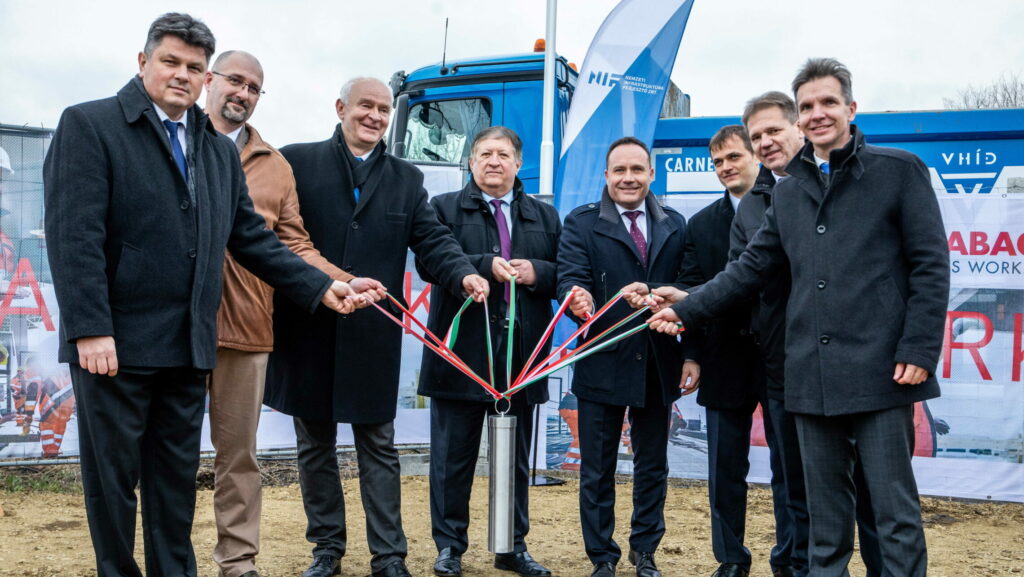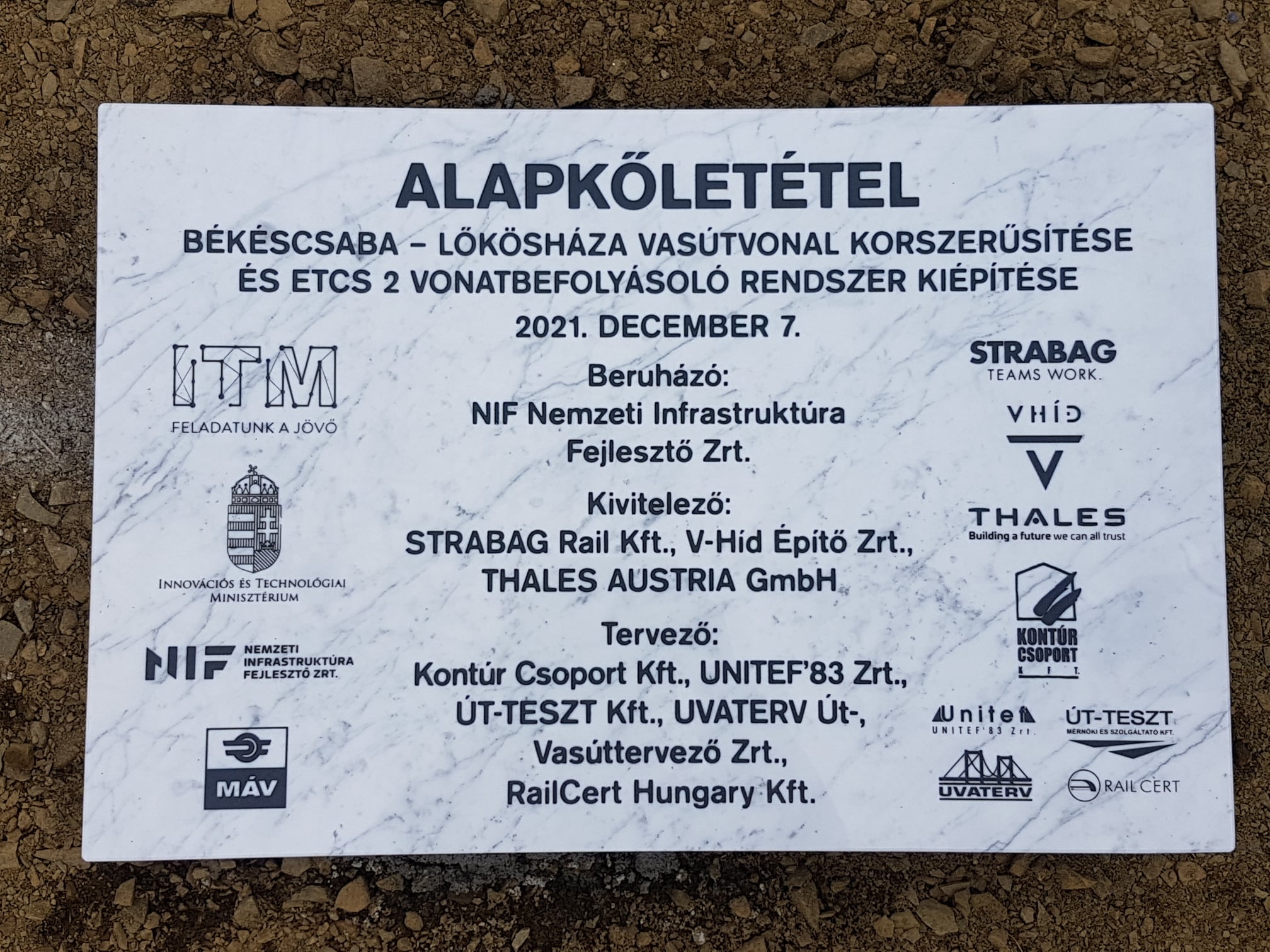The https://english.atlatszo.hu use cookies to track and profile customers such as action tags and pixel tracking on our website to assist our marketing. On our website we use technical, analytical, marketing and preference cookies. These are necessary for our site to work properly and to give us inforamation about how our site is used. See Cookies Policy
Railway project price hike benefits Lőrinc Mészáros, officials blame it on the war
The upgrade of the Békéscsaba-Lőkösháza railway line in Hungary has become significantly more expensive than originally planned. The contract, originally awarded in 2021 for HUF 126.8 billion, has now increased by HUF 6.6 billion. Like many time before, officials citing inflation due to the Russia-Ukraine war as the reason for the cost hike, which happens to benefit a company of Lőrinc Mészáros.
In 2021, the upgrade of the railway section between Békéscsaba and Lőkösháza was awarded to the joint venture of Austria’s Strabag domestic subsidiary and V‑Híd Zrt., a company owned by oligarch Lőrinc Mészáros, on a net bid of HUF 126.8 billion (EUR 320 million). Though the upgrade is still ongoing, costs have already increased by another HUF 6.6 billion.

During the 15 years of the Fidesz government, cost overruns of large-scale publicly funded projects has become commonplace. Officials would usually explaine away these price hikes by citing “unforeseeable reasons”. Since January 2023, they added a new phrase to their vocabulary: “inflation due to the Russian-Ukrainian war”. Among many recent billion-forints price increases, the cost overrun of the Békéscsaba-Lőkösháza railway is the latest to be explain with the war.
The national infrastructure developer NIF (Nemzeti Infrastruktúrafejlesztő Zrt.) issued a public procurement for modernization of the approximately 30‑km-long railway stretch in October 2020. The scope included the reconstruction of the existing track, construction of a second track, modernization of three stations (Szabadkígyós, Kétegyháza, Lőkösháza), upgrading of the overhead electric line, building station platforms, underpasses, elevators, and noise barriers.
Initially, NIF had estimated the net project cost at HUF 116.7 billion (292.8 million EUR), but the bids received during the tenderwere significantly higher. The contract was awared to the Strabag/V‑Híd consortium, which initially submitted the lowest bid at EUR 318 million. Subcontractors included R‑Kord Kft. (also linked to Mészáros), the Austrian subsidiary of the French company Thales, and the domestic branches of both V‑Híd and Strabag.
At the time of award, this was already the most expensive railway modernization in Hungary, with a cost of roughly HUF 4.37 billion (EUR 11 million) per kilometer.
However, records last only until they are broken. In this case, it was broken by the record holder itself. According to information recently published in the European Union’s public procurement bulletin, on July 11, 2025, the Ministry of Construction and Transport, which took over the role of the now defunct NIF, amended the contract with the contractors.
The essence of the change is that The Strabag subsidiary and V-Híd will receive an additional HUF 6.6 billion (EUR 16.66 million), or a total of HUF 133.4 billion (EUR 336.6 million) net for the work.
This means that the cost of renovating the 29-kilometer Békéscsaba–Lőkösháza railway line, which is being paid for by the government from European Union funds, has risen to HUF 4.6 billion (EUR 11.61 million) per kilometer.
Further cost increases expected
The justification here is the same as that increasingly used by the government to explain the billion-forint price increases: inflation caused by the Russian-Ukrainian war.
According to a government decree issued in January 2023, contractors have the right to initiate contract amendments if they have incurred cost increases greater than the “normal business risk” specified in the decree, “attributable to the situation caused by the war conflict.” The state will then pay contractors up to half of the additional costs, minus the amount attributable to normal business risk.
According to information on the cost increase for the renovation of the Békéscsaba–Lőkösháza railway line, the contractors Strabag and V-Híd initiated a contract amendment on December 7, 2023, due to “interim additional fee claims arising from circumstances related to the war,” in order to “reimburse the interim additional costs incurred due to circumstances related to the war.”
In their submission, they requested an additional net cost of HUF 27.8 billion (EUR 70.17 million) for the period between February 24, 2022, and September 30, 2023.
The investigation by the Ministry of Construction and Transport (ÉKM) found that the contractors’ “total cost increase exceeding the normal business risk” amounted to HUF 13.2 billion (EUR 33.31 million), and, in accordance with the 2023 government decree, the ministry will pay them half of this, a net surplus of HUF 6.6 billion (EUR 16.66 million).
However, as the work is still ongoing, costs may rise further, as the current price increase only applies to the period before September 30, 2023. The completion of the renovation of the Békéscsaba–Lőkösháza railway line was initially promised for last summer, but according to the latest government promises, it will only be handed over sometime this year.
Written by Katalin Erdélyi, translated by Zalán Zubor. The Hungarian version of this story is here. Cover image: Representatives of MÁV, NIF, Strabag, V-Híd and other important figures place the time capsule at the groundbreaking ceremony for the modernization of the Békéscsaba-Lőkösháza railway line in Kétegyháza on December 7, 2021. (photo: MTI/Tibor Rosta)
Share:
Your support matters. Your donation helps us to uncover the truth.
- PayPal
- Bank transfer
- Patreon
- Benevity
Support our work with a PayPal donation to the Átlátszónet Foundation! Thank you.
Support our work by bank transfer to the account of the Átlátszónet Foundation. Please add in the comments: “Donation”
Beneficiary: Átlátszónet Alapítvány, bank name and address: Raiffeisen Bank, H-1054 Budapest, Akadémia utca 6.
EUR: IBAN HU36 1201 1265 0142 5189 0040 0002
USD: IBAN HU36 1201 1265 0142 5189 0050 0009
HUF: IBAN HU78 1201 1265 0142 5189 0030 0005
SWIFT: UBRTHUHB
Be a follower on Patreon
Support us on Benevity!


